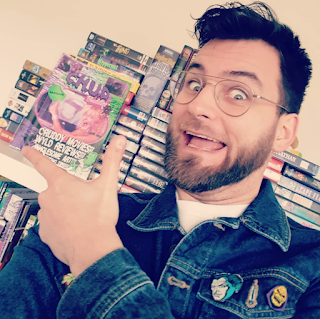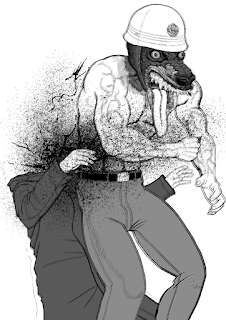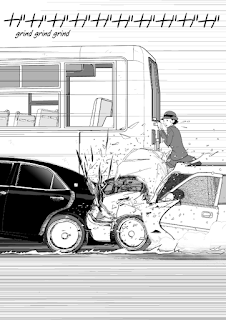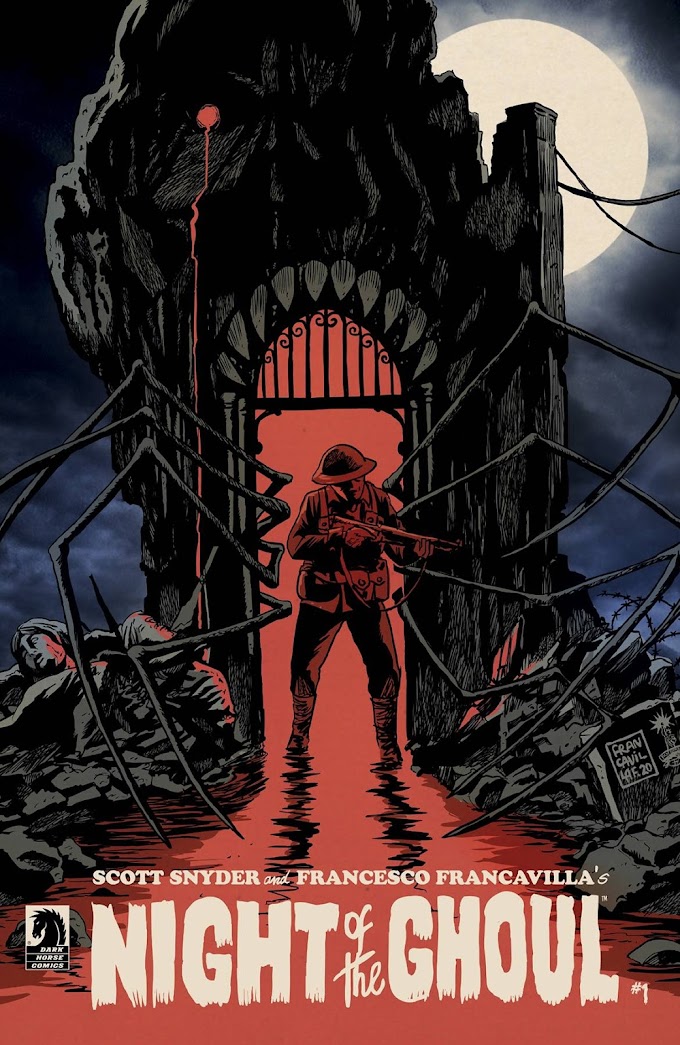A couple of years ago I kept reading the same few people reviewing the movies I was watching on Letterboxd. One of them was a guy named Carlo Vanstiphout who was active with movie podcasts and hosts online screenings of cult and obscure movies. But he was also translating to English and publishing online Matsunaga Toyokazu’s long-running and only just recently completed webcomic, PaperakQ.
Matsunaga Toyokazu’s Bakune Young is top tier for me, every page is a joy. And the same sense of humor, character-driven plotting, gory action, and sense of disgust for authority is all here in PaperaQ. But PaperaQ was created by Matsunaga Toyokazu outside the auspices of the Japanese manga studio system, drawn entirely by himself and posted online, one page a day, for free, for ten years. Understanding that context helps make sense of the spare or non-existent backgrounds of PaperaQ. And characters often look cut and pasted, altered only slightly from earlier drawings of them. Combined with the 3000+ length of the comic I think this probably dooms it’s commercial prospects for physical publishing in the US and it’s a pleasant surprise someone has taken the effort on to do this at all, let alone with permission from the artist.
The story is about a young boy with an infectious disease which causes crab legs to grow out of his head. But as you would expect of a comic of this length, the story spirals out from there pulling in additional characters and complexity as it goes along. It’s available in 12 chunks of 300-400 pages for a pay what you want scheme at https://paperakyu.itch.io/.
Panel Patter: Can you tell me where you are from and how you learned Japanese?
Carlo: I am from a place called Genk in a place called Belgium, and I’ve learned Japanese in a vast range of ways going from night school to a stint in college, but more recently it’s all just been self-study.
I know you do a podcast and host movies online - can you give me some background on those projects?
Well I have a lot of hobbies, and I love each and every one and probably spend way too much time going down rabbit holes trying to learn as much as I can about them. I still love manga but ever since I started using Letterboxd it’s movies that have taken over the bulk of my recreational activities. The main “hub” of what I do is probably Crud Buddies, which is a B-movie Discord I started because I wanted a more direct way of interacting with other Letterboxd users. I like to describe it as a place for people who are open to everything and everyone. Since then we’ve branched out into making merchandise like a bootleg re-issue of an out of print McGruff tape, a Youtube channel we use for sharing the obscure and hard to get, and a podcast sub-series that is part of the “Notes from the Back Row” podcast feed, where we talk about what we’ve been watching, new movie releases, and other tangents.
I don’t know to what extent being fluent in Western languages will help you with Japanese as they have next to nothing in common aside from words that were introduced by or borrowed from French, Dutch, Portuguese, or English. What helped more than being bilingual is plain old self-motivation and a general interest in languages.
What was your original motivation to learn Japanese?
Probably more of a fluke, really. I’d been interested in manga and anime for a couple years until my friend said “hey I’m gonna take a Japanese class at a local night school” so I tagged along and ended up sticking with it far longer than he ever did. This was around 2008. Then volunteering at Mangascreener was where I learned the ropes of adapting manga. I became friends with people who had A: great taste, B: ethics, and C: were just super down to earth about what the quality of adapted manga should be.
How did you first get in touch with Toyokazu Matsunaga?
I first read Matsunaga’s Ryuguden over a decade ago via Mangascreener. Once I fall in love with a manga I try to keep up with what the author is working on, so one day I found out he’d started self-publishing PaperaQ on his website, and it looked like something I could try my hand at translating. Seeing how there was no publisher involved I figured it’d be worth a shot to ask him for his blessing, so I found him on Facebook and popped the question.
Was this your first translation effort?
It’s been over a decade since I did those first 12 chapters of PaperaQ so I don’t quite remember the timeline, but I think I did some other stuff here and there to test the waters. It’s definitely the first manga translation I saw through till the end.
I didn’t realize you had been working on it for that long!
I actually haven’t been working on it for an entire decade, though. The fact of the matter is that in 2009 when I did those first 12 chapters I was trying to keep up with Matsunaga’s monthly output, until I hit a wall when the content became increasingly more difficult, so I had no choice but to put it on ice. But then in October of 2020 I found out Matsunaga had wrapped PaperaQ so I picked it back up again and finished the remaining 98 chapters like something had possessed me. I say “something” like I don’t know what it is, but a big part of it was a guilty conscience about dropping the project a decade ago.
At what point did you put it up on Gumroad? Did you just have it available for free prior to that?
Yeah at first I was just putting them on my tumblr because it was more of an experiment that I figured not a lot of people would be interested in. But then along the way as I felt more confident about potentially finishing what I started, I decided to put everything on Gumroad as a way of expressing appreciation for Matsunaga’s work in a way that goes beyond just saying “thanks.”
Well, Matsunaga is a bit of a controversial figure in that he doesn’t have any mainstream sensibilities, and he’s not a conformist. My understanding is that at one point he was tired of doing things for an editor/publisher, and took the reins in his own hands. So he basically drew one page a day from 2011-2019, and uploaded whatever he had on the first of every month during that period. Having published my own zine there’s only one conclusion and that is that digital self-publication is the easiest, most cost-efficient way to do it.
What was the name of the zine you published?
It was simply called CHUD Buddies, which was the original name for Crud Buddies until I decided to change it to remove any possible link to a word I became aware of has an alt-right connotation these days. It’s still available on the Crud Buddies Etsy for a buck.
Is there more of a market for a comic like PaperaQ in Japan that makes the format somewhat less impractical?
I don’t believe PaperaQ was created to be practical, or targeted at anyone, really. This is just a guy who was done putting up a façade or catering to a crowd, but still loves drawing, and had a worthwhile story to tell. So that’s what he did, while he still could. Whether people like it or not.
Does Matsunaga speak English at all, and have you had any feedback from him about your translation choices?
I’ve never had a conversation with him in English, but I do get the sense from forwarding fan responses to him that he can either understand the gist of things or is savvy enough to use Google translate. As for the translation I also get the sense he trusts me completely, as I’ve never gotten any specific feedback on it other than him being happy with the mere fact I was doing it.
Can you describe what your process is for translation? Did it change at all over the course of this project?
It’s definitely changed as I got more fluent in Japanese. But just out of habit I still transcribe, then translate, and as I’m lettering the script I double check, and revise a bunch so it flows better. I’ve also gotten more confident in straying from literal translations so long as the tone and gist of it remains intact. And sometimes I will use my artistic freedom as a non-robot and go “this would be very funny and it will not change the story one bit so in it goes.”
Were there parts of this comic that were particularly challenging to translate or involved a tough judgement call of some sort?
Matsunaga has definitely thrown me a couple of curveballs. One thing he likes to do is take uncommon onomatopoeia that he used in an action scene, and re-incorporate it in the dialogue a couple pages later. The worst part I can remember is definitely early on in the second arc where I had to translate a page that was basically one big online bulletin board thread. Usually when I second guess myself to the point I’m not seeing an outcome, I do the same thing when I’m stuck on a puzzle in a video game, and take some distance or ask for a second opinion.
Where does the word PaperaQ come from? It seems like random nonsense word so I’m curious if it’s a literal translation from a Japanese word that sounds the same or was arrived at in some other way.
I can confirm it’s just a nonsense word he came up with during grade school that’s stuck with him over the years.
Sometimes you've spelled it Paperakyu and sometimes PaperaQ - is there a reason for the different spellings?
It’s fairly inconsistent within the Japanese manga, too. There are a handful of instances where he uses the romaji “PAPERAQ,” but usually it’s just written in katakana “Paperakyu.” In the English version it just makes more sense when you’re working with an all-capitalized font to use “Paperakyu” for readability, as opposed to the title on the cover where I go for PaperaQ. If I used “PAPERAQ” in the manga people might think it reads as “Paperak.”
Do you have any other manga translation projects planned?
I’d love to break into professional translating, but I haven’t been able to get a foot in the door yet. PaperaQ was an ideal excuse to not only showcase something that I feel deserves more love than people would otherwise give it, but also a challenge for myself and something I could put on my resume ideally. PaperaQ was also just an ideal exception because of the fact it is basically a doujinshi, and what happens to it is all up to one man: the author.
Are there any other comics or even movies that PaperaQ reminds you of? It seems to me like it’s written like a long running commercial manga series in a lot of ways, jumping forward and backward in time by years or decades to flesh out the story in an ever expanding circle or complications and characters with relationships to each other and then letting the implications of that play out overtime. But it’s such a unique combination of earnest and silly.
Honestly I don’t know if Matsunaga had planned for PaperaQ to be this big, epic, century-spanning thing when he started it. A good writer at least knows what they’re working towards, and the middle part you kinda figure out along the way. Matsunaga’s other manga are the obvious go-to in terms of similar works, but I feel like with PaperaQ he had way more time to let it breathe and incorporate his own beliefs about karma and justice and all that. I truly think it’s his magnum opus, in the same sense that Akira is Katsuhiro Otomo’s magnum opus, or how the Nausica manga is Hayao Miyazaki’s, Osamu Tezuka’s Buddha, Taiyo Matsumoto’s Number 5, Kazuo Umezu’s Fourteen. I love movies but they are by design a bit too limited to tell this type of story. It’s much more like a serialized drama, so for me I suppose only Twin Peaks is a match in terms of depth and that same balance of tones.
Either way it’s the visual style that throws people off, mostly. I doubt anyone who reads the first ten chapters of PaperaQ and writes it off as just some silly, gratuitous comic realizes the extent to which everything is the way it is for some pretty fucked up reasons that are rooted in a dark side of actual Japanese history. I’ll go as far as saying it’s made me an even more curious person.
---
Update February 6, 2022: Text above has been updated to reflect the comics move from Gumroad to Itch.









![Sweat and Soap [Ase to Sekken] by Kintetsu Yamada](https://blogger.googleusercontent.com/img/b/R29vZ2xl/AVvXsEgMnQltxjWqGS1_duhCp9Er1a0NbALuSFrqvjaV4_PjN_w67xCGghYt-l0qKyqTH7Ei7gbq_mxVq8aPAuOiyaArwAMLJWhpGmOYaARUBnwvjmv2-ZIe20m_zR5CvKnPdI6US_AuOnmi3gSX/w680/57525895-BA7E-4EF8-9FE4-89F9C164E1A4.jpeg)

